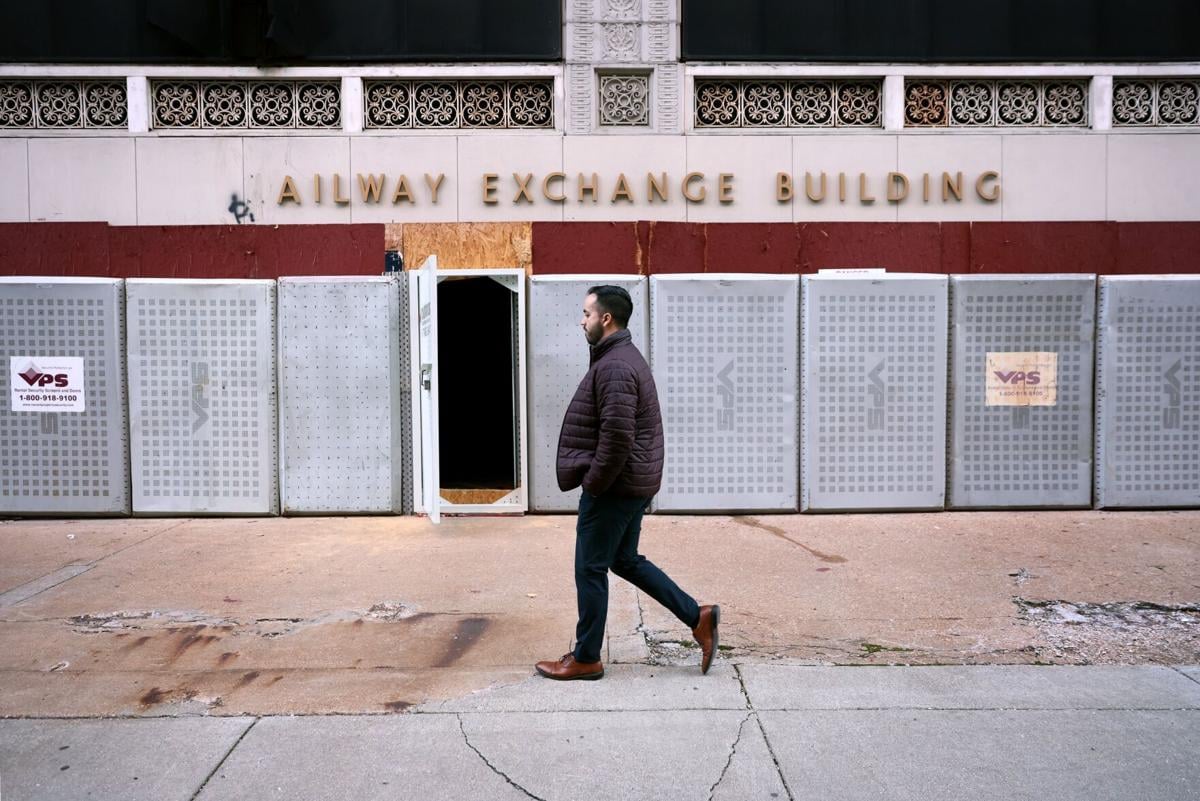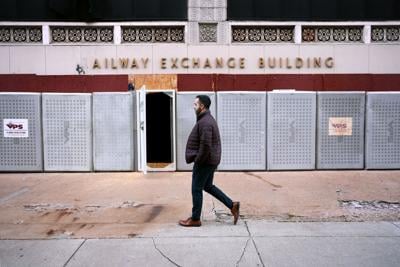ST. LOUIS ŌĆö City officials sued to take ownership of downtownŌĆÖs beleaguered Railway Exchange Building in a bid to jump-start redevelopment and end lawlessness at the vacant behemoth.
The city┬Ā┬Ālate Thursday after Florida-based owner Hudson Holdings ignored the cityŌĆÖs offer this summer to buy the 1.2 million-square-foot property at 615 Olive Street for $5.3 million, what a third-party appraisal determined the building and its adjacent garage are worth.
Hudson co-founder Andrew ŌĆ£AviŌĆØ Greenbaum did not respond to a request for comment.
The cityŌĆÖs suit aims to take possession of the building through eminent domain, which gives governments the right to take private property for public use or to serve public good. The unusual approach ŌĆö on such a prominent downtown building, before a redevelopment plan has been crafted ŌĆö marks a milestone in City HallŌĆÖs approach to absentee owners and the protection of historic buildings, which boosters see as a way of turning around ├█č┐┤½├ĮŌĆÖ misfortunes.
People are also reading…
ŌĆ£If youŌĆÖre an absentee property owner,ŌĆØ Mayor Tishaura O. Jones said in a statement, ŌĆØneglect is no longer welcome in the city of ├█č┐┤½├Į.ŌĆØ
Steph Kukuljan and other business reporters bring you insights into ├█č┐┤½├Į-area real estate and development.
The 21-story Railway Exchange, erected around 1914, takes up an entire city block in the heart of downtownŌĆÖs business district. Preservationists say itŌĆÖs an architectural jewel, with its terra cotta and brick adornments and marble paneling. ItŌĆÖs one of four major vacant buildings, including the former AT&T tower, the Chemical Building and the Millennium Hotel, that city officials say are crucial to revitalizing downtown.
It was once home of the flagship Famous-Barr department store, renowned for its shopping, and also its quaint second-floor restaurant and famous French onion soup.
But its last tenant, MacyŌĆÖs, left around 2014, and the building has been vacant since. Proposed redevelopment efforts failed.
Hudson Holdings, led by Greenbaum and Steven Michael, bought the Railway Exchange and its parking garage in 2017 for $20 million and planned a $300 million mixed-use development ŌĆö even after a water main rupture dumped millions of gallons of water and tons of sludge in the basement, destroying infrastructure.
But Hudson was never able to move past planning stages as lawsuits mounted from its lender and contractors it initially hired to develop a plan for the building.
The cityŌĆÖs path to eminent domain took┬Ānearly two years. In January 2023, the Building Division condemned the property.
The lawlessness that Railway attracted and the absentee owner forced the cityŌĆÖs hand, officials said.
People lived in ceilings and in between floors, according to┬Āemails depicting the chaos. Copper thieves snaked through underground tunnels to gain entry.
Last October, aldermen filed a bill allowing the city to use eminent domain on the property.
In April, it was featured in┬Ā┬Āabout downtownŌĆÖs woes.
And in June, the ├█č┐┤½├Į Development Corp., the cityŌĆÖs economic development agency,┬Āsent a letter to Hudson offering to buy the building. City officials have not disclosed what they offered. But they promised to use eminent domain if the parties couldnŌĆÖt cut a deal.
Now officials and boosters have lofty ambitious for the Railway Exchange: They envision hundreds of people working or living there, prompting businesses to open in the neighborhood and spurring other developments downtown.
Downtown cannot move forward without addressing the Railway Exchange vacancy, said Jason Hall, CEO of regional business group Greater ├█č┐┤½├Į Inc.
The buildingŌĆÖs owners have ŌĆ£continued to thumb their nosesŌĆØ at the city, he said. He called the mayorŌĆÖs move to use eminent domain ŌĆ£bold.ŌĆØ
ŌĆ£Holding them accountable and using the full legal power that she has to take that action, we applaud this,ŌĆØ Hall said. ŌĆ£It needs to be addressed. If theyŌĆÖre unwilling to do it in a negotiated way, the mayor has the authority to resolve this in the courts, and I applaud her, and we applaud her, for taking that step.ŌĆØ
A revitalized Railway Exchange could mean thousands, if not millions, of dollars in new tax revenue for the city and a rejuvenated downtown that could harken back to the cityŌĆÖs glory days, boosters say.
ŌĆ£We have been moving aggressively to accelerate the process of securing Railway Exchange with the ultimate goal of stabilizing it for future redevelopment,ŌĆØ SLDCŌĆÖs President and CEO, Neal Richardson, said in a statement. ŌĆ£Bringing Railway Exchange under local control will be a huge step in ensuring future redevelopment plans align with the communityŌĆÖs best interests.ŌĆØ
Jacob Barker of the Post-Dispatch contributed to this report.
Emails obtained by the Post-Dispatch┬Ādetail┬Āthe dangers the Railway Exchange Building poses as well as the city's growing frustration with the owner.┬Ā
City officials said Tuesday that they've started steps to acquire downtown's troubled Railway Exchange Building to clear the way for a long-awaited redevelopment.┬Ā
Illegal scrapping was a contributing factor to last month's fire at the historic Railway Exchange Building in downtown ├█č┐┤½├Į, officials said Wednesday.┬Ā
The liens are one of the hurdles impeding redevelopment of the historic Railway Exchange Building.┬Ā
The owner of downtown's Railway Exchange Building has stopped paying for security, heightening concerns over the dangers the property poses to the public.┬Ā
Alderwoman Cara Spencer filed legislation to launch eminent domain proceedings against the absentee owner of downtown's Railway Exchange Building.
The online auction is slated for July.┬ĀHudson Holdings' plans to convert the Railway Exchange into apartments and office space stalled, and┬Ālenders and contractors have been fighting in court over payment.┬Ā
The owner of the troubled Railway Exchange Building in downtown ├█č┐┤½├Į is moving to shore up security after mounting pressure from the city.┬Ā
The condemnation of the Railway Exchange Building┬Ācould eventually allow the city to take possession and clear the way for a long-awaited redevelopment.┬Ā






















